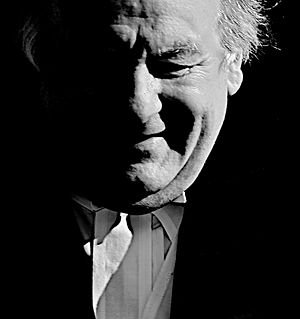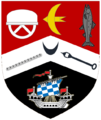Michael Martin, Baron Martin of Springburn facts for kids
Quick facts for kids
The Lord Martin of Springburn
|
|
|---|---|

Martin in 2007
|
|
| Speaker of the House of Commons of the United Kingdom | |
| In office 23 October 2000 – 21 June 2009 |
|
| Monarch | Elizabeth II |
| Prime Minister | |
| Preceded by | Betty Boothroyd |
| Succeeded by | John Bercow |
| Deputy Speaker of the House of Commons First Deputy Chairman of Ways and Means |
|
| In office 14 May 1997 – 23 October 2000 |
|
| Speaker | Betty Boothroyd |
| Preceded by | Geoffrey Lofthouse |
| Succeeded by | Sylvia Heal |
| Member of the House of Lords Lord Temporal |
|
| In office 25 August 2009 – 29 April 2018 Life peerage |
|
| Member of Parliament for Glasgow North East Glasgow Springburn (1979–2005) |
|
| In office 3 May 1979 – 22 June 2009 |
|
| Preceded by | Richard Buchanan |
| Succeeded by | Willie Bain |
| Personal details | |
| Born |
Michael John Martin
3 July 1945 Glasgow, Scotland |
| Died | 29 April 2018 (aged 72) Glasgow, Scotland |
| Political party | Crossbench |
| Other political affiliations |
|
| Spouse |
Mary McLay
(m. 1966) |
| Children | 2 (including Paul) |
Michael John Martin, Baron Martin of Springburn (born 3 July 1945 – died 29 April 2018) was a British politician. He was best known for being the Speaker of the House of Commons from 2000 to 2009. Before that, he was a Member of Parliament (MP) for the Labour Party. He represented areas in Glasgow, Scotland, from 1979 until 2009.
When he became Speaker in 2000, he was the first Catholic to hold this important role since the Reformation. He stepped down from the position in 2009. This happened because some people in Parliament and the public had concerns about how expenses were handled.
Contents
Early Life and Work
Michael Martin was born in Glasgow, Scotland, on 3 July 1945. His father was a merchant seaman, and his mother cleaned schools. He was one of five children. His family lived in a tenement (a large apartment building) in Anderston before moving to Springburn when he was 14.
He left school just before his 15th birthday. He started working as an apprentice sheet metal worker. He worked at a factory and later at a railway yard. He became involved in trade unions, which are groups that protect workers' rights. At 21, he joined the Labour Party. He worked for Rolls-Royce for many years. By his mid-twenties, he was a full-time shop steward, representing workers.
In 1973, when he was 26, Martin was elected as a Labour councillor for Glasgow. This meant he helped make decisions for the city. He also worked as a trade union organiser from 1976 to 1979.
Becoming a Member of Parliament
In 1979, Michael Martin was chosen by the Labour Party to become a Member of Parliament (MP). An MP is a person elected to represent a group of people (a constituency) in the House of Commons. He was elected for Glasgow Springburn in the 1979 general election.
He was re-elected several times, in 1983, 1987, 1992, and 1997. He was known for his socially conservative views within the Labour Party. From 1987 to 1997, he led the Scottish Grand Committee, a group of MPs who discuss Scottish matters. In 1997, he became a Deputy Speaker, helping to lead debates in the House of Commons.
Becoming Speaker of the House of Commons
In 2000, the Speaker at the time, Betty Boothroyd, retired. An election was held to choose the next Speaker. Twelve MPs wanted the job. Many people thought a Conservative MP, George Young, would win. However, many MPs, especially from the Labour Party, felt he wasn't connected enough to ordinary MPs.
After several rounds of voting, Michael Martin was elected as the 156th Speaker on 23 October 2000. He made history as the first Catholic Speaker since the Reformation. When someone becomes Speaker, they usually leave their political party. So, Martin resigned from the Labour Party. He also chose not to wear some of the traditional Speaker's clothes, like the wig and silk stockings.
He was re-elected as an MP and as Speaker in the 2001 and 2005 general elections. Other major parties usually do not challenge the Speaker in their constituency elections.
In 2003, even though he was Catholic, Martin made sure the House of Commons got its own hannukiah (a special candle holder used during Hanukkah). Before this, they had to borrow one every year.
In 2005, after the general election, an MP named Patsy Calton came to Parliament in a wheelchair. She was very ill. Michael Martin broke with tradition by leaving his chair to shake her hand and greet her warmly. She sadly passed away three days later. In 2006, he had a heart procedure and was away from his duties for a few weeks.
Questions in Parliament
In 2006, during Prime Minister's Questions (PMQs), Michael Martin stopped a question from the Opposition Leader, David Cameron. PMQs is a time when MPs can ask the Prime Minister questions about the government's actions. Martin said Cameron's question about the Labour Party's future leader was not about government actions. This caused a lot of discussion among MPs.
Concerns About Expenses
In 2007, there were concerns about how public money was being used. Michael Martin used public funds to pay lawyers to deal with negative news stories. He was also criticised for trying to stop details of MPs' travel expenses from being made public.
In 2008, more questions were raised about expenses, especially those claimed by his wife for taxi rides. A person who worked for Martin resigned after admitting he had been given wrong information about these expenses. There were also reports about the cost of refurbishing the Speaker's official home, Speaker's House.
Resignation as Speaker
Because of the ongoing concerns about expenses and a loss of confidence from some MPs and the public, Michael Martin faced pressure to resign. On 19 May 2009, he announced that he would step down as Speaker on 21 June 2009. If he hadn't resigned, he would have been the first Speaker to be forced out by a vote of no confidence since 1695.
After leaving his role as Speaker, he also stepped down as an MP. An election was then held to choose a new Speaker, and John Bercow won.
Life Peerage and Later Life
It is a tradition for Speakers to be given a life peerage when they retire. This means they become a member of the House of Lords for the rest of their life. On 25 August 2009, Michael Martin was made Baron Martin of Springburn. He joined the House of Lords on 13 October 2009. Like other former Speakers in the Lords, he sat as a Crossbench peer, meaning he did not belong to a specific political party.
Michael Martin passed away on 29 April 2018, after a short illness. Many politicians, including Jeremy Corbyn and Gordon Brown, paid tribute to him.
Family Life
Michael Martin met his wife, Mary McLay, at the Heatovent factory where they both worked. They married in 1966 and had a son and a daughter. Their son, Paul Martin, also became a politician. He was a Member of the Scottish Parliament (MSP) for the Labour Party from 1999 to 2016.
Michael Martin enjoyed playing the bagpipes. He often played them for guests at his annual Burns night supper. He once helped the Scottish National Party (SNP) group get permission to play bagpipes on the parliamentary estate for a St Andrew's Day reception, even though the Serjeant at Arms had initially said no.
Images for kids
See also
 In Spanish: Michael Martin, Baron Martin de Springburn para niños
In Spanish: Michael Martin, Baron Martin de Springburn para niños
 | George Robert Carruthers |
 | Patricia Bath |
 | Jan Ernst Matzeliger |
 | Alexander Miles |



